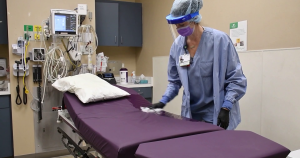Mandatory mask usage in parts of Germany last spring helped significantly reduce the number of new Covid-19 infections, a team of German researchers reported in a new analysis.
The team used public data on coronavirus cases to compare regions with and without mandatory mask policies last April.
“Depending on the region we consider, we find that face masks reduced the number of newly registered severe acute respiratory syndrome coronavirus 2 infections between 15% and 75% over a period of 20 days after their mandatory introduction,” researchers wrote. “Assessing the credibility of the various estimates, we conclude that face masks reduce the daily growth rate of reported infections by around 47%.”
The study, which was published Thursday in the journal Proceedings of the National Academy of Sciences, also found that certain age groups benefited more from mask usage.
The researchers looked at data from mask use in Jena, a city in central Germany, after a mandatory mask policy took effect between April 1-10.
They compared Jena’s mandatory mask policy with a control group, a similar city that experienced comparable growth in coronavirus cases before the mandatory mask policy in Jena.
They found a “significant difference” in Covid-19 case reductions in Jena.
“Our findings indicate that the early introduction of face masks in Jena has resulted in a drop in newly registered COVID-19 cases of around 75% after 20 days,” the team reported.
“Put simply, if the control region observes 100 new infections over a period of 20 days, the mask region observes only 25 cases,” they wrote.
“This drop is greatest, by more than 90%, for the age group 60 years and above.”
The study also concluded that, given the low cost compared to other public health measures, masks are a cost-effective way to combat the spread of coronavirus.
The analysis did not look at the different types of face masks and whether that could have affected the conclusion.
Previous studies on the use of face masks in public have also they reduce the spread of Covid -19.



















